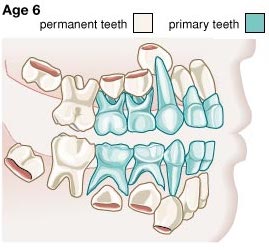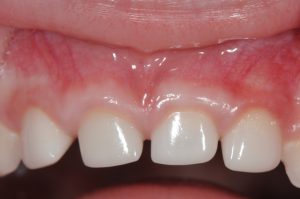
Why Are Baby Teeth So Important?
Prevent Future Orthodontic Problems
 The Consequences of Not Treating Decayed Teeth
The Consequences of Not Treating Decayed Teeth

Pediatric Dentist Yardley PA Kids Dentistry | Growing Smiles In Floral Vale
Pediatric Dentist Yardley PA Kids Dentistry | Growing Smiles In Floral Vale

 The Consequences of Not Treating Decayed Teeth
The Consequences of Not Treating Decayed Teeth
This is one of the most common we questions we get at Growing Smiles in Floral Vale. Tooth-grinding or bruxism is defined as “the habitual nonfunctional forceful contact between occlusal (biting surface) tooth surfaces than can occur while awake or asleep.” According to the American Academy of Pediatric Dentistry a study of over 800 patients under the age of 17 found that 38% of children grind their teeth.
There are several reasons why children grind or clench their jaws during sleep. Typically it is a benign behavior that can occur due to the upper and lower jaws not aligning correctly or in response to a emotional stress, such as an upcoming test. Children typically grow out of this problem by age ten without causing any permanent damage to their teeth.
When to become concerned:
If grinding is accompanied by snoring, bed wetting, or poor performance in school your child maybe suffering from obstructive sleep apnea. At this point we would recommend you speaking to your pediatrician or an otolaryngologist if we suspect sleep apnea is an underlying cause of your child’s grinding.
If grinding persists into their permanent dentition, we may recommend treatment in the form of a custom-made night-guard to wear at night.
The majority of children eventually will grow out of this habit. If it concerning to you, please don’t hesitate and call us to schedule an appointment. We can conduct an examination, offer a diagnosis and recommend treatment if necessary.
Dental crowns are tooth shaped coverings that are typically placed on severely decayed teeth or teeth that have fractured due to trauma. Crowns are cemented over the remaining tooth structure restoring the tooth to its original shape and function.
Zirconia crowns are particularly useful when children damage their teeth on the playground, in a sporting event or some direct trauma that chips or cracks a child’s tooth. Cosmetically, a child can be affected negatively if other children make fun of the way they smile. Also, a badly damaged tooth can lead to additional exposure to decay. So there is good reason to repair badly damaged teeth with pediatric dental crowns.
More than likely, the dentist will need to shape the damaged or decayed tooth. This requires removing the decayed or damaged enamel and dentin until the tooth structure is small enough for the crown to fit comfortably on top. First, you need to decide what kind of material you want your child’s crown to be made out of. The most commonly used materials are stainless steel (silver appearance) or zirconia (white appearance).
Stainless steel crowns have been used for decades in pediatric dentistry and do a wonderful job of restoring function to your child’s teeth. The only complaint with stainless steel crowns are their poor esthetics.
In contrast to the poor esthetics of stainless steel, zironica crowns are great if you want to maintain the natural aesthetic of your kid’s smile.
Depending on the behavior of the child and the amount of work needed; you and the dentist will decide on the best type of treatment for a child.
Crowns provide confidence to kids who would be self-conscious. They also improve speech patterns and prevent lisps or slurred speech. Crowns are also incredibly durable and most last until the time the tooth should exfoliate.
Pediatric dental crowns are a great form of cosmetic dentistry for kids. Crowns can enhance a smile while making it easier to chew and talk. Do not delay taking your youngster to our office when there is an emergency. Your child will be thankful you took an active approach to his or her dental health.
Xylitol is a naturally occurring sugar alcohol found in small amounts of fruits and vegetables. It has been used as a sweetener aimed to improve oral health1. Xylitol as well as other sugar alcohols are not readily metabolized by oral bacteria, and thus are considered non-cariogenic sugar substitutes 2.
Xylitol is available in many forms (eg, gums, mints, chewable tablets, lozenges, toothpastes, mouthwashes, cough mixtures, and oral wipes). The chewing process enhances the caries inhibitory effect.
The main concern with xylitol is in order to see the dental benefits, one must consume 3-8 gram each day and spread out that amount 5 times throughout the day. At this constant level abdominal distress and diarrhea have been reported 3.
Overall the results are inconclusive for caries reduction in short term use as well as long-term use. To consume 3-8 grams of Xylitol is unrealistic in a clinical practice 4,5.

At Growing Smiles in Floral Vale, we agree with the American Academy of Pediatric Dentistry that Xylitol is a non-cariogenic replacement for sugar. But the lack of consistent evidence that Xylitol reduces the cavity causing bacteria in children in addition to the abdominal side effects is why we do not recommend the use of Xylitol as part of a daily oral health regimen.
Xylitol and Dogs:
Xylitol is considered safe for human consumption, it is extremely toxic to dogs. Only 0.10 g/kg of xylitol can cause issues. Thus a dog weighing about 7 pounds (3kg) can get sick from eating less than 1 piece of xylitol chewing gum.
References
1. Mäkinen KK. Biochemical principles of the use of xylitol in medicine and nutrition with special consideration of dental aspects. Experientia Suppl 1978;30:1-160.
2. Scheinin A, Mäkinen KK, Ylitalo K. Turku sugar studies. V. Final report on the effect of sucrose, fructose and xylitol diets on caries incidence in man. Acta Odontol Scand 1976;34(4):179-216
3.Ly KA, Milgrom P, Rothen M. Xylitol, sweeteners, and dental caries. Pediatr Dent 2006;28(2):154-63. Discussion 192-8.
4. Oscarson P, Lif Holgerson P, Sjöström I, Twetman S, Stecksén-Blicks C. Influence of a low xylitol-dose on mutans streptococci colonisation and caries development in preschool children. Eur Arch Paediatr Dent 2006; 7(3):142-7.
Stecksén-Blicks C, Holgerson PL, Twetman S. Effect of xylitol and xylitol-fluoride lozenges on approximal caries development in high caries-risk children. Int J Paediatr Dent 2008;18(3):170-7.
Kovari H, Pienihäkkinen K, Alanen P. Use of xylitol chewing gum in daycare centers: A follow-up study in Savonlinna, Finland. Acta Odontol Scand 2003;61(6):367-70.
5: Hujoel PP, Mäkinen KK, Bennett CA, et al. The optimum time to initiate habitual xylitol gum-chewing for obtaining long-term caries prevention. J Dent Res 1999; 78(3):797-803.
This is one of the most common questions I get from parents of 6 and 7 year-olds. Even though there are multiple reasons why your child’s permanent teeth are yellow, the most common reason is the intrinsic color difference between the permanent teeth and baby teeth.
This yellow appearance is also enhanced by the fact that they sit right next to baby teeth. This contrast between they very white baby teeth makes the grown up teeth look even more yellow.
Primary teeth have a milky white appearance when compared to the sometimes yellowish appearance of the permanent teeth. Primary teeth have thinner enamel, less amount of dentin and dentin in primary teeth is less yellow in color.
Permanent teeth have a greater amount of dentin, which is yellow in color. Since enamel is translucent the color of the dentin shows through. When all the permanent teeth have erupted the color will blend and appear uniform.
Young permanent teeth have very large nerve canals when they erupt and these teeth are more transparent, leading to a yellower appearance. As we age, the canals slowly calcify and the tooth will naturally lighten.
1. Good oral hygiene is always key. We recommend the use of an electric toothbrush as soon as the permanent teeth erupt. This will help remove any surface stains on the teeth.
2. Make sure you see us for a professional cleaning every 6 months.
3. Bleaching: we do not recommend the use of over-the-counter bleaching materials until your child is about 16. It can cause severe sensitivity and if used while your child is in mixed dentition the new teeth erupting will be mismatched.
As always feel free to call us at 215-860-9808 if you have any questions or concerns.
Dr. Ross Levine is a board certified pediatric dentist and has been honored by both
The Bucks County Courier Times and Philadelphia Magazine as a
Top Pediatric Dentist in Bucks County.